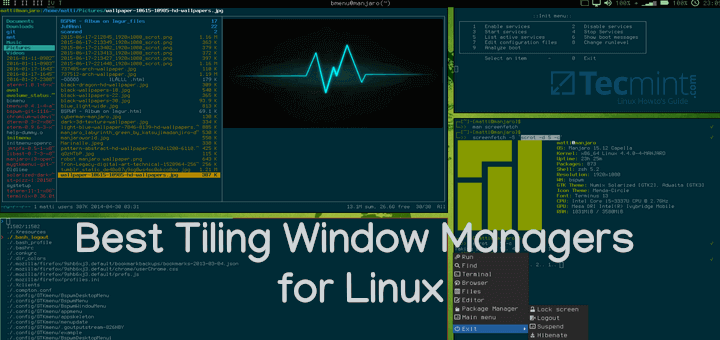Time is money, as goes an old saying, therefore you need to manage it very well. This then calls for proper planning of your daily schedule, future events, appointments, and several other daily activities.
But you can’t keep all your plans in mind, I guess no, at least a few but not all. So you need to have certain things around you to always keep reminding you of what you want to do, the people you are hoping to meet, events you plan to attend, and many more.
You can only achieve this efficiently and flexibly by using a calendar application, especially on your Linux desktop. In this article, we shall walk through a brief review of some of the best calendar applications that can help us plan and manage our daily lives.
1. KOrganizer
KOrganizer stands as the premier calendar and scheduling element of the Kontact suite that excels in managing events, and tasks, and offers features like alarm alerts, seamless web exports, and network transparency in data handling.
Notably, it integrates effortlessly with a broad range of calendaring platforms such as NextCloud, Kolab, and Google Calendar.
It comprehensively features rich, some of its notable features include:
- Supports multiple calendars and to-do lists.
- Supports attachment of events and todos.
- Quick event and to-do entry.
- Undo and redo functions.
- Alarm notifications.
- Todo integration with agenda view.
- Plugin for Jewish calendar dates.
- Kontact integration.
- Highly customizable.
- Supports web export plus so much more.
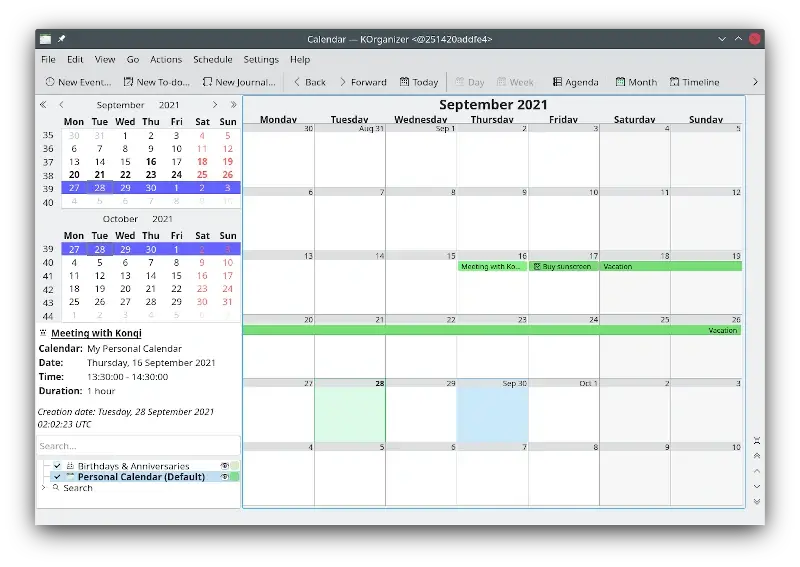
To install KOrganizer on Linux, run:
$ sudo apt install korganizer [On Debian, Ubuntu and Mint] $ sudo yum install korganizer [On RHEL/CentOS/Fedora and Rocky/AlmaLinux] $ sudo emerge -a sys-apps/korganizer [On Gentoo Linux] $ sudo apk add korganizer [On Alpine Linux] $ sudo pacman -S korganizer [On Arch Linux] $ sudo zypper install korganizer [On OpenSUSE]
2. Evolution
Evolution is a comprehensive personal information management software for the GNOME desktop that includes a calendar and address book plus a mail client. It can also work on several other desktop environments including Cinnamon, MATE, and KDE.
As an integrated software, it comes with several remarkable features, but for calendar functionality, it offers the following features:
- Allows adding, editing, and deleting of appointments.
- Supports customization of calendar layout.
- Supports reminders for appointments and events.
- Enables sorting and organizing of calendars.
- Supports sending of invitations by email.
- Supports sharing of calendar information.
- Enables classification of appointments and vital tasks on groupware servers.
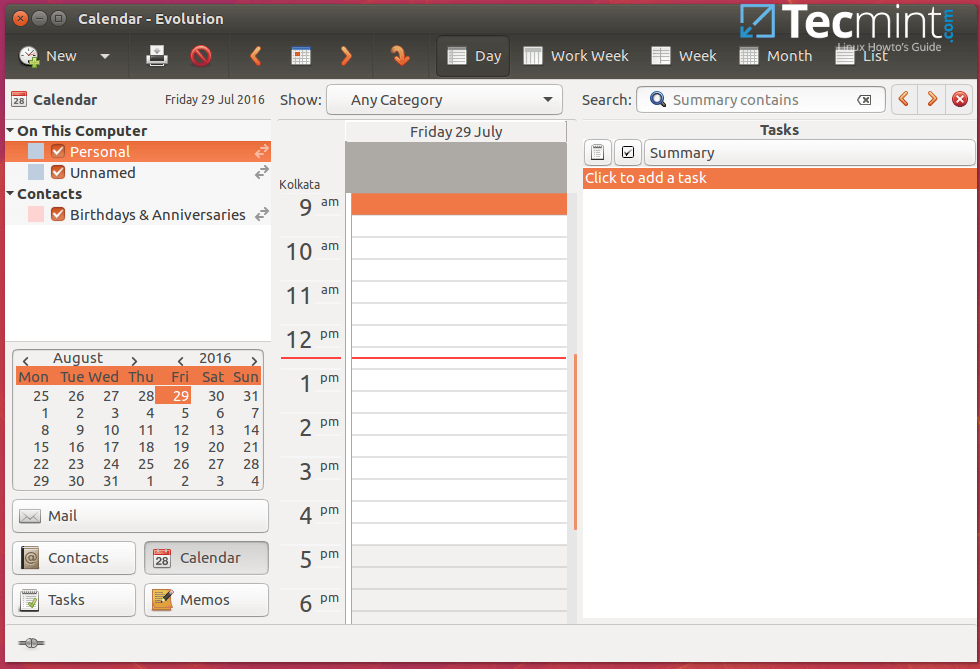
To install Evolution on Linux, run:
$ sudo apt install evolution [On Debian, Ubuntu and Mint] $ sudo yum install evolution [On RHEL/CentOS/Fedora and Rocky/AlmaLinux] $ sudo emerge -a sys-apps/evolution [On Gentoo Linux] $ sudo apk add evolution [On Alpine Linux] $ sudo pacman -S evolution [On Arch Linux] $ sudo zypper install evolution [On OpenSUSE]
3. Calcurse
Calcurse is a simple yet powerful text-based calendar and organizer that you can also use on Linux, especially if you spend a great deal of your time on the command line.
It enables users to keep track of all daily activities that they want to perform, plans, appointments, and future events that they want to accomplish, fulfill, and attend.
It offers some great and remarkable features including:
- Configurable notification system as a reminder of future events, capable of sending emails and beyond.
- Highly customizable curses interface to meet a user’s needs.
- Supports numerous kinds of appointments and todos.
- Highly configurable key bindings.
- Support for importing iCalender format files.
- Support for UTF-8.
- Support for exporting to several formats including iCalender and pcal.
- Offers an impressive non-interactive command line that supports scripts.
- Also supports running scripts while loading or saving data plus many more.
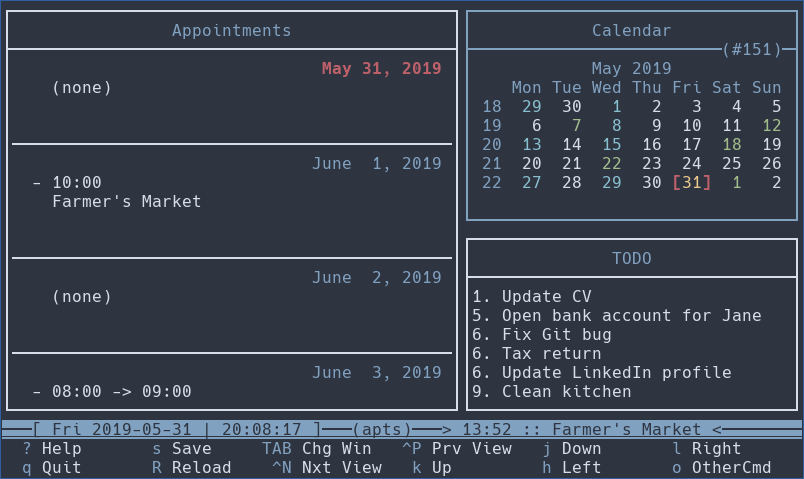
To install Calcurse on Linux, run:
$ sudo apt install calcurse [On Debian, Ubuntu and Mint] $ sudo yum install calcurse [On RHEL/CentOS/Fedora and Rocky/AlmaLinux] $ sudo emerge -a sys-apps/calcurse [On Gentoo Linux] $ sudo apk add calcurse [On Alpine Linux] $ sudo pacman -S calcurse [On Arch Linux] $ sudo zypper install calcurse [On OpenSUSE]
4. Osmo
Osmo is a GTK-based personal organizer that comes with a calendar, tasks manager, date calculator, address book and notes modules that were designed to be a lightweight, easy to use and perfect-looking PIM tool that will help you to manage personal information in a plain XML database.

To install Osmo on Linux, run:
$ sudo apt install osmo [On Debian, Ubuntu and Mint] $ sudo yum install osmo [On RHEL/CentOS/Fedora and Rocky/AlmaLinux] $ sudo emerge -a sys-apps/osmo [On Gentoo Linux] $ sudo apk add osmo [On Alpine Linux] $ sudo pacman -S osmo [On Arch Linux] $ sudo zypper install osmo [On OpenSUSE]
5. GNOME Calendar
GNOME Calendar is a simple and beautiful calendar application that seamlessly integrates with the GNOME desktop environment to offer a harmonious user experience within the desktop.
It comes with all the necessary calendar features such as adding or deleting events, editing, rescheduling, dragging, and dropping, syncing the online calendars, and much more.
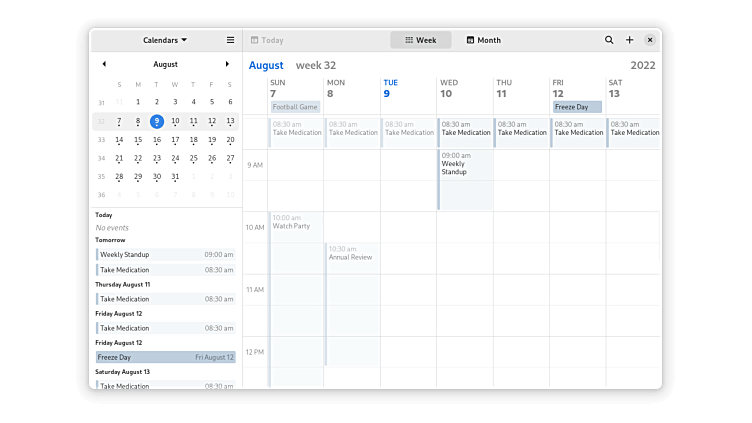
To install GNOME Calendar on Linux, run:
$ sudo apt install gnome-calendar [On Debian, Ubuntu and Mint] $ sudo yum install gnome-calendar [On RHEL/CentOS/Fedora and Rocky/AlmaLinux] $ sudo emerge -a sys-apps/gnome-calendar [On Gentoo Linux] $ sudo apk add gnome-calendar [On Alpine Linux] $ sudo pacman -S gnome-calendar [On Arch Linux] $ sudo zypper install gnome-calendar [On OpenSUSE]
6. Morgen Calendar
Morgen Calendar offers an unparalleled time management experience on a Linux desktop that seamlessly integrates calendars, task management, and advanced scheduling with an intuitive and sleek UX.
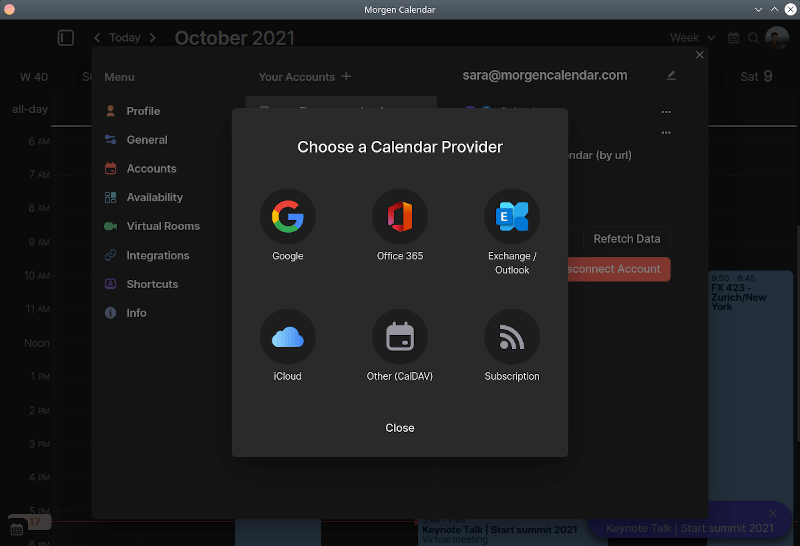
To install Morgen Calendar on Linux, you need to use Snap as shown.
$ sudo snap install morgen
7. Rainlendar
Rainlendar is another GUI-based robust calendar application that is compatible with several platforms to offer a range of features such as multiple calendars, to-do lists, event reminders and alarms, support for iCalendar and CalDAV, alarm clock, weather forecast, notes, and much more.
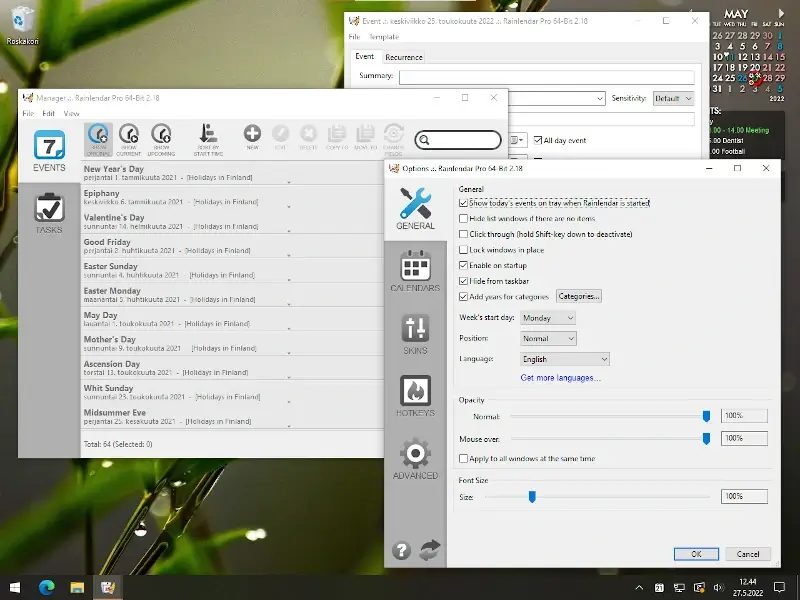
If you are using a Debian-based Linux distribution, you should download the .deb installer for Ubuntu. For other distributions, download the Generic Linux package and decompress it manually.
Conclusion
In this brief review, we covered some of the best calendar apps that you can install on your Linux desktop to help you efficiently plan and manage your daily schedule and events, plus so much more in relation to time management.
Is there any calendar app with some remarkable components missing in the list above, then give us feedback through the comment section below.


